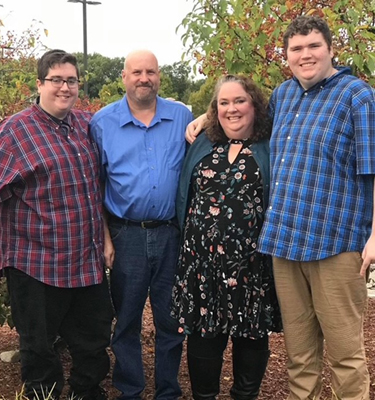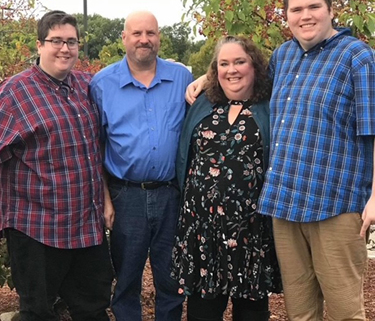Care During COVID-19: An “Essential” Working Family’s Story
By Sethany Griffin

I am a member of The Arc and both a provider for adults and children with disabilities and a mother of an adult with autism and an intellectual delay. My son Karl is 19, and he typically attends an adult transition program five days a week where he learns vocational skills in the hopes of someday finding him a paying job. He also focuses on social interactions, self-advocacy, problem solving, self-care skills and strength building through physical therapy.
My son’s transition program, like so many others, closed temporarily and without notice in the early months of the coronavirus pandemic. Like many families, we were left scrambling to ensure his needs were being met and that he wasn’t left alone, grappling with the unknown timetable of when things would be back to normal.
I work as the Director of Family supports for a large non-profit agency for families like myself, with children and adult family members with disabilities. My husband, Dana, had just started a new job and was not yet eligible for leave time. Our older son DJ, who is also Karl’s co-guardian, works as a direct service professional at a day program for the same non-profit as I do. All three of us are considered “essential workers.” We are also the only people who can effectively support Karl at home.
It has been—and continues to be—a huge struggle trying to juggle the work schedules of three “essential” adults while ensuring someone is staying with my son who can both understand and meet his needs. Karl is a wonderful young man. He loves all things Marvel and can tell you anything you ever wanted to know about Marvel heroes and the TV show “Supernatural.” He likes to ride his adult tricycle around the neighborhood and swim, and he wants to make money to buy all the Marvel Legends action figures in existence. When he is anxious, which is almost always, he knits his brows and rocks in place. For the unfamiliar onlooker, he can appear terrifying. He is also 6’6 and 330 pounds and can become aggressive when he is frustrated or scared. This isn’t something that just anyone could handle.
Ultimately, we decided that DJ would take an unpaid leave of absence to care for his brother. DJ is still living with us, so we covered his rent and paid for his food. But, going without a paycheck meant that he was no longer able to purchase non-essentials or save any money. By covering his bills, we have made our family financial situation even more precarious.
It is unfair to all of us that he had to make this sacrifice, but we weren’t left with any other choices.
Now that our state has started to re-open, we find the struggle even harder. All four of us are in one form or another back to work. When Karl returned to his program, he did it in a hybrid fashion, He doesn’t do well with “remote teaching” so those times were essentially useless and required a full-time caregiver. I am lucky enough to be able to work some hours from home, and my husband has started earning his paid time off. We are making it work, but this isn’t what “vacation time” was supposed to be used for. Right now, if Karl were to spike a fever for any reason, he would be required to stay home for two weeks. I don’t know what we are going to do when that happens, but we are a strong and resilient family, so we will continue to brainstorm and try to find viable solutions.
For people with disabilities and their families, it is so important that paid leave policies include all caregivers—not just parents. Siblings, cousins, Godparents, aunts, uncles, and grandparents have all stepped in and tried to help us. Paid leave for all caregivers would remove so much pressure from families who are already struggling with the expenses of caring for an individual with additional emotional and healthcare needs. A paid leave option for all caregivers is long overdue.








